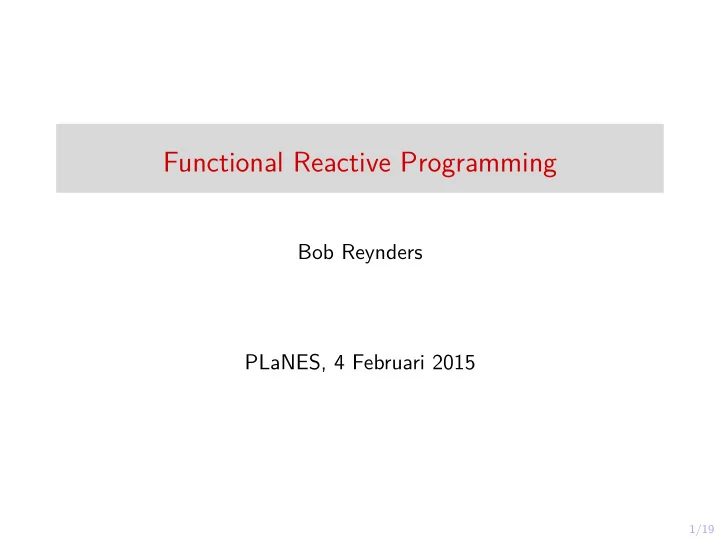

Functional Reactive Programming Bob Reynders PLaNES, 4 Februari 2015 1/19
Functional Reactive Programming ◮ Event discrete values ◮ Mouse.click: Event[Click] ◮ ≈ List[(Time, A)] ◮ Behavior time-varying values ◮ Mouse.position: Behavior[Coordinate] ◮ ≈ Time => A 2/19
FRP API (subset) Event[T].map[A](f: T => A): Event[A] Beh[T].map[A](f: T => A): Beh[A] // Filter Event[T].keepIf(f: T => Boolean): Event[T] // Lift Beh[T].combine[A, B](b: Beh[A])(f: (T, A) => B): Beh[B] Event[T].merge(e: Event[T]): Event[T] // Sampling Beh[T].sampledBy(e: Event[_]): Event[T] // State Event[T].fold[A](initial: A)(fun: (A, T) => A): Beh[A] 3/19
GUI Example // input val plusE: Event[Int] = plusButton.click.map(_ => 1) val minE: Event[Int] = minButton.click.map(_ => -1) val merged: Event[Int] = plusE.merge(minE) // state val counter: Beh[Int] = merged.fold(0) { (acc, e) => acc + e } // view def template(data: Int): GUI = ... val main: Beh[GUI] = counter.map(template) 4/19
Static Dependency Graph +1 -1 merge (0, -1, +1, +1, +1, ...) fold 0 counter World (0, -1, 0, 1, 2, …) main (span(0), span(-1), ...) Figure 1: Static graph ◮ First order FRP ◮ Static guarantees 5/19
Dynamic Dependency Graph New Figure 2: Switch ◮ Higher order FRP ◮ Event[Behavior[T]].switch: Behavior[T] 6/19
Glitch-freedom x x2 always True val x: Beh[Int] val x2 = x.map(_ * 2) val alwaysTrue = x.combine(x2)(_ <= _) 7/19
Multi-tier Functional Reactive Programming 8/19
Multi-tier Functional Reactive Programming // One language ServerEvent[T].map[A](f: T => A): ServerEvent[A] ClientEvent[T].map[A](f: Rep[T] => Rep[A]): ClientEvent[A] ... ◮ Embed Javascript as a DSL in Scala ◮ Rep[String] = (Client) Javascript String ◮ String = (Server) Scala String 9/19
Multi-tier API Extension // Replication between tiers ClientEvent[T].toServerAnon: ServerEvent[T] ServerEvent[T].toAllClients: ClientEvent[T] // Server -> Client ServerBeh[T].toAllClients: ClientBeh[T] 10/19
Chat Application // prepare input val nameB: ClientBeh[String] = nameInput.text val msgB: ClientBeh[String] = msgInput.text val clickE: ClientEvent[MouseData] = sendBtn.click // model entries (across tiers!) val entryB = nameB.combine(msgB)(_ + ": " + _) val submitE = entryB.sampledBy(clickE).toServerAnon // model server application state val chatB: ServerBeh[List[String]] = submitE.fold(List.empty[String]) { (acc, entry) => entry :: acc } // view (template on the client) def template(view: Rep[List[String]]): Rep[GUI] = ... val main: ClientBeh[GUI] = chatB.toAllClients.map(template) 11/19
Chat Application 12/19
Multi-tier API Extension // Client-aware replication // - Track sources ClientEvent[T].toServer: ServerEvent[(Client, T)] ServerEvent[Client => Option[T]].toClient: ClientEvent[T] ServerBeh[Client => T].toClient: ClientBeh[T] 13/19
Multi-tier API Extension // Generalise to categories of programs Event[C1, T].anonTo[C2]: Event[C2, T] // - Track sources Event[C1, Id[C2] => Option[T]].to[C2]: Event[C2, (Id[C1], T)] 14/19
Glitch-freedom val src: ClientEvent[Int] val x2 = src.map(_ * 2).toServer val alwaysTrue = src.hold(0).combine(x2.hold(0))(_ < _) 15/19
Glitch-freedom: naive ◮ 1 propagation on the client → 2 on the server Multi-tier FRP Server Client toServer Src’ Src _ < _ x2’ x2 16/19
Glitch-freedom: glitch-free tiers ◮ 1 propagation on the client → 1 on the server Multi-tier FRP Server Client toServer Src’ Src _ < _ x2’ x2 17/19
Glitch-freedom: total Figure 3: Distributed REScala: An Update Algorithm for Distributed Reactive Programming 18/19
Network Overhead val serverB: Behavior[List[Behavior[Int]]] // changes of Int val serverB: Behavior[List[Int]] // changes of List[Int] val incServerB: IncBehavior[List[Int], Delta] // changes of Delta 19/19
Recommend
More recommend